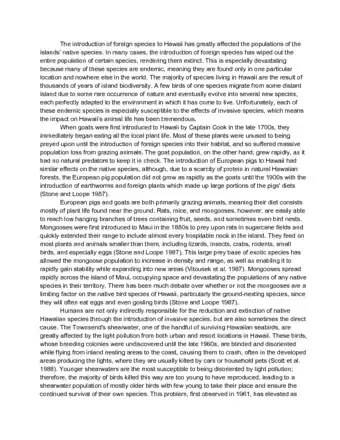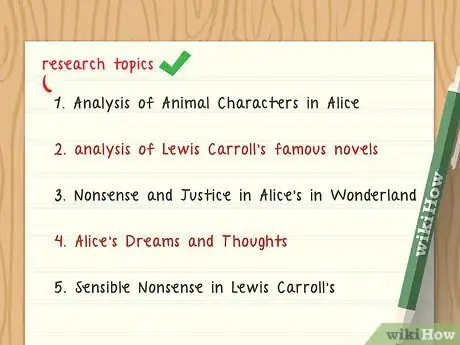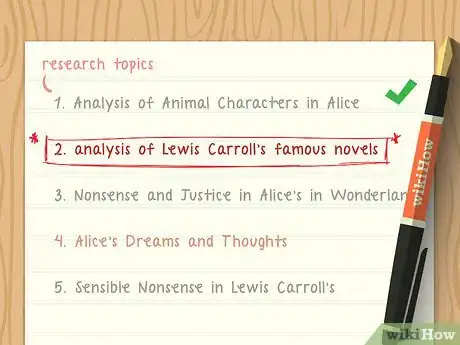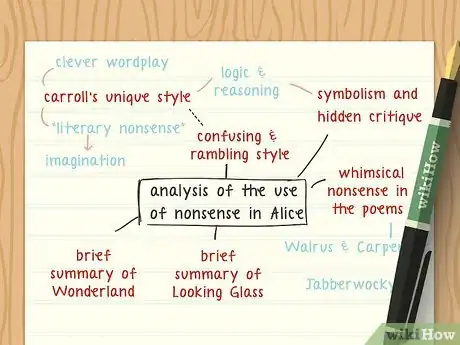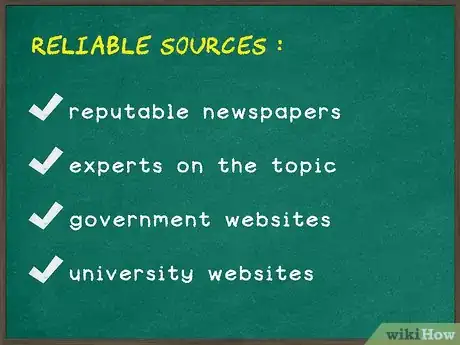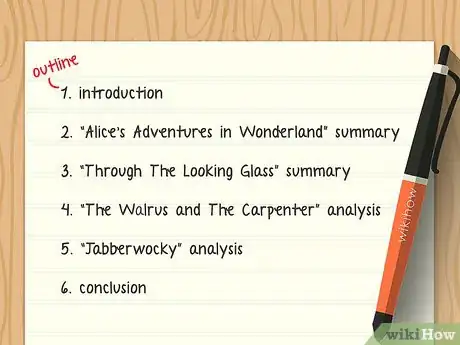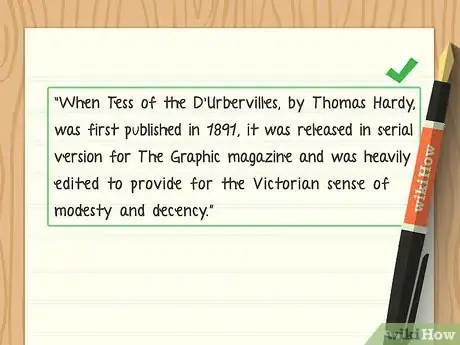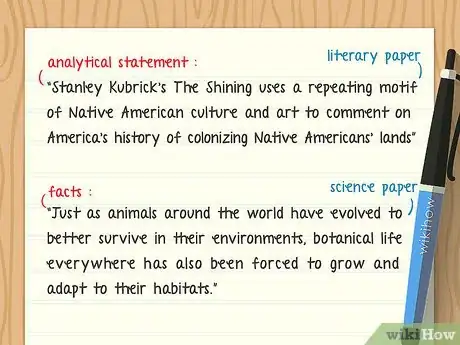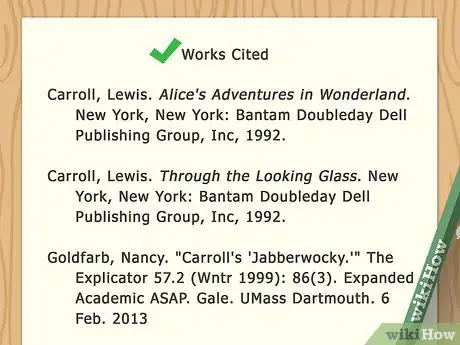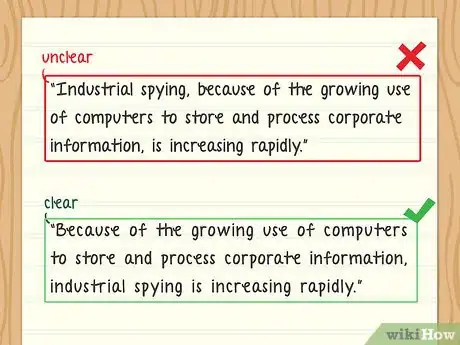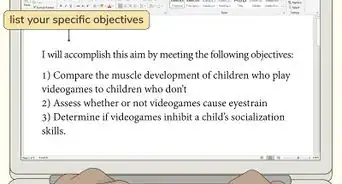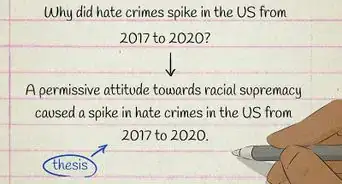This article was co-authored by Matthew Snipp, PhD. C. Matthew Snipp is the Burnet C. and Mildred Finley Wohlford Professor of Humanities and Sciences in the Department of Sociology at Stanford University. He is also the Director for the Institute for Research in the Social Science’s Secure Data Center. He has been a Research Fellow at the U.S. Bureau of the Census and a Fellow at the Center for Advanced Study in the Behavioral Sciences. He has published 3 books and over 70 articles and book chapters on demography, economic development, poverty and unemployment. He is also currently serving on the National Institute of Child Health and Development’s Population Science Subcommittee. He holds a Ph.D. in Sociology from the University of Wisconsin—Madison.
There are 19 references cited in this article, which can be found at the bottom of the page.
This article has been viewed 310,526 times.
A research paper employs primary sources/data to support a thesis statement. It is a type of persuasive essay used frequently in science, literature, and history curricula. Regardless of your level of education and chosen field, you'll need to follow a few simple steps to get your research paper off the ground. You'll need to decide on a topic, formulate a thesis statement, conduct research, organize your findings, and then set pen to paper or fingers to keyboard.
Steps
Sample Research Papers
Deciding on a Topic
-
1Get started early. Most likely, you'll bounce around from topic to topic until one sticks. You'll need time to rebound and to change topics. College professors recommend that you get started on your research paper the day it is assigned. The more time and effort you put into it, the better your grade will be. So get started now. Don't procrastinate.
-
2Examine the assignment. If you are in school, you'll need to read the prompt provided by your teacher. If you are writing a research paper for your job, know what your employer expects. Your paper will undoubtedly have guidelines or requirements that will fundamentally shape your research. Know what those guidelines are at the very beginning. You don't want to start working on it and find out later that you need to start over again.[1]
- For example, if you are writing a research paper for a college course, you should know how long it should be, what sources can be used, the topics you can choose from, and the deadline to turn it in. Once you understand the parameters, you can set out a schedule to complete the paper on time.[2]
Advertisement -
3Consult research on possible topics. The best way to narrow down a research paper is to see what else has been written on the subject.[3] Consult Google Scholar or do a quick web search to see what the major trends are.
- For example, if you are taking an American history course and you want to write a research paper on the origins of the American Revolution, you'd probably want to begin by reading other books on the subject. You'll soon realize that historians have discussed the Revolution's origins primarily in political and economic terms, but have given less attention to the social dimensions of the revolutionary experience. So you decide to focus — broadly — on the social origins of the American Revolution.
-
4Narrow down your subject, if possible. Depending on the size requirements of your paper, you'll need to narrow your research question. Papers that are really short — 1 to 2 pages — will need a narrower question than a dissertation spanning hundreds of pages.[4]
- Let's return to the social origins of the American Revolution. You might be able to cover this topic in 500 pages, but if you are writing a 20-page research paper for a class, you'll need to focus your topic further. What social group or groups will you focus on in order to address the social origins of the American Revolution? Break down the "social" into categories — women, racial minorities, farmers, city-dwellers, writers, travelers, businessmen, or children. There are numerous different angles you can take. See what hasn't been written before and then write on that subject.
-
5Choose your topic. At some point, you'll need to settle on a topic and begin research. Remember that after the researching phase, you'll probably adjust your topic. This is normal. Everyone does it.[5]
- Let's say that you've decided to focus on the role of farmers and the American Revolution. Try to formulate a question based on your narrowed field such as: What role did farmers play in the origins of the American Revolution?
Constructing a Thesis
-
1Formulate several hypotheses. These are potential answers to your research question. Use what you know about the topic to surmise possible answers to your question.[6]
- For example, you could answer the above question (i.e., What role did farmers play in the origins of the American Revolution?) in several ways. Farmers directly participated in public riots against British officers. Farmers refused to sell their crops to British contingents. Farmers refused to quarter British soldiers in their homes. Farmers refused to pay taxes on their goods.
- It is a good idea to start with several hypothetical thesis statements. If one proves to be false or isn't supported by enough evidence, you can start in a new direction quickly.
-
2Make sure your thesis is explicit. Your thesis statement is the key to your entire paper. Be sure to include all necessary information in it, so the reader knows exactly what you'll argue over the course of the paper.[7]
- For example: The quartering of British soldiers in the homes of poor farmers caused them to protest British taxes and to attack British troops.
- This is a single sentence thesis statement that addresses both why the farmers chose to revolt and how they did so.
-
3Discuss your working thesis statement with others. Sometimes, our ideas make great sense to us, but don't translate clearly to others. Be sure to ask others to evaluate your thesis statement before you begin your research process. This is a fail-safe. It will make sure that you don't fall down a rabbit hole. Show your thesis statement to your professor.[8]
- If your professor wanted to you to focus on the political causes of the American Revolution, she might stop you from researching farmers. This would save you time in the long run.
Performing Research
-
1Identify primary sources/data sources. Depending on your project, you'll need to find ways of collecting information to back up your claims.[9] If your paper is on a science topic, you'll need to set up an experiment and collect data from that experiment. If you are writing a history paper, you'll need to find primary sources (information produced during the time under investigation) that support your thesis statement. Primary sources can be found in a variety of locations. Some are reprinted in primary source collections. Others can only be accessed in archives or libraries.[10]
- For our paper on the role of farmers and the American Revolution, we might need to visit local archives and the U.S. National Archives and Records Administration to get the necessary documents.
- If you're feeling overwhelmed by the volume of research, see if your library has appointments with a research librarian. Librarians stay up to date with current trends in scholarship and can help guide your search.[11]
-
2Take extensive notes. While you are performing your experiment or conducting research in an archive or a library, you'll want to create a detailed record of your findings. Take notes on a computer or using note cards.[12]
- Include author, title, and publication information in your notes, so that you can type up a reference list at the end of your research paper. You can also use a program such as EndNote, RefWorks, or LaTEX to help you manage your citations.
- Create a note sheet of quotations that you may want to use in your research paper. It is better to gather more than you need at this point, since you will need evidence from reputable sources to support your thesis.[13]
-
3Evaluate your sources. Do some research about the author, so that you can establish their credibility. Were your documents created by somebody with an obvious bias? Are your documents original or were they reproduced after the fact? Is the document complete?[14]
- For web sources, use sources from peer-reviewed journals, government institutions and organizations, and public archives first. Blogs and other non-authoritative web sources are usually inappropriate for a research paper.
- Organize your notes. Put your notes/data in a logical order that backs up your thesis statement. Organize them so they flow from one to the next. For our imaginary project, it would be best to put your notes on quartered British troops before notes on farmer's revolutionary actions. Since our argument is that quartered troops angered farmers into action, we need to discuss them in that order. [15]
-
4Interpret your findings. Does the information you've found support your thesis statement? Does it cause you to rethink your original hypothesis? Or does your research further clarify your original thesis statement? If so, make the necessary adjustments.[16]
- For example, if you discovered that farmers were primarily unhappy quartering British soldiers because they ate all their food, you'd want to include that information in your thesis statement.
- Quartered British troops consumed large quantities of food while housed with poor farmers. Because they couldn't feed themselves and quarter troops, these farmers chose to protest British taxes and to attack British troops. As such, farmers played a significant role in the origins of the American Revolution.
Starting Your Research Paper
-
1Write an outline. An outline is a great place to organize your thoughts before you sit down to write. It is also a great place to figure out what needs to come first. Once you have a general idea of the trajectory of your paper, you'll be able to introduce it more efficiently.[17]
- Consider composing an outline as a list of questions you would like to answer. Start with your thesis at the beginning, then break it down into sections that back up your argument. Write questions like "Why is this research important?" and "What studies support my thesis?" Then insert information you found while researching into your outline that answers these questions.
- You can also write a prose outline, instead of a question-based outline. Place headers that are the subjects of each paragraph or section of your research paper. Add quotes and other notes in bullets below the subject. You can begin your composition directly from a prose-based outline.
- Continue researching if you need to fill holes in your outline. Be sure to gather bibliographic information as you go.
-
2Start with a factual statement about your subject. Some people like to start broad and work their way into a research topic. This reaches those people who want to know the broad appeal of your work. If you're writing a paper on the importance of comics, you could assert the importance of comic books since the 1930s. If you want to discuss the role of farmers in the American Revolution, you can make a blanket statement about the complex causes of the revolutionary movement.
- This is how most people begin their research papers. They don't want to make their subject seem too obscure, so they write about larger points before jumping head first into their topic.[18]
- Just make sure that your broad statement is related to your thesis statement. And make sure that everyone can agree with your broad statement. You don't want to have your readership criticizing your argument from the beginning. You need to build a certain degree of trust.
- By all means, avoid the "Throughout history" or "In modern society" types of opening lines. These are so overused that they have become hackneyed, and they will damage your credibility as a writer before your reader has looked at another word.[19]
-
3Review what else has been written on your topic. One of the best ways to begin a paper is to tell your audience what else exists. If you are writing on the role of farmers during the American Revolution, begin by discussing those works that directly or tangentially discuss the subject. Then explain how your work adds to the conversation or does something differently. This will answer that nagging question in your readers' minds - why do I need to read this research paper?[20]
-
4Define your terms. We've all seen those individuals who begin papers or speeches by quoting Webster's Dictionary. It is hackneyed most of the time because the speaker or author defines a common word that most people know. If your topic is more obscure or the audience knows nothing about it, you might need to start by establishing a baseline of knowledge.
- For example, if you want to write a research paper on philately (stamp collecting), you should probably begin by defining your key term. But don't go for the standard "Webster's Dictionary defines philately as..." opening. See if you can make your opening line attention-grabbing or intriguing.[21]
-
5Begin with a true story. This works well for history papers in particular. A story about an individual family that attacked a quartered British soldier in the middle of the night for eating all of their bread would be a suitable story for a paper on the role of farmers in the early American Revolution.
- By setting up this story at the beginning, you'd be able to return to it periodically over the course of your paper to illustrate points and to re-assert your thesis statement.[22]
- Interesting anecdotes or surprising facts can be a good way to hook your readers and lead in to your thesis statement.[23]
-
6Understand what is conventional for your field. You can begin with broad analytical statements or with a story for most fields, but in some it is less appropriate and helpful than others. While historians can make use of both broad claims and stories, biologists might not be able to. If a biologist wanted to write a paper on the photosynthesis process in celery stalks, they might not want to begin with a story - especially not a hypothetical one. "A celery stalk was basking in the sun working on its tan" would be a terrible way to begin a biology research paper. It would just seem silly. In short, know your audience. Who will read this paper? Will they enjoy the way you began your story?
- If you aren't sure about how to start your essay, have a look at some published works in your subject. They'll be a lot fancier than your paper needs to be, but they can give you a sense of that subject's conventions.
Drafting Your Research Paper
-
1Write your first draft. During this draft, you will answer your primary question with your thesis statement and then systematically support that statement with evidence acquired during your research phase. Write a complete rough draft before you start editing. It is easier to get all of your thoughts out on the paper (especially if you have a solid outline to follow) and then go back and edit. Don't edit as you go. It will disrupt your thought process.
- Some writers find it helpful to write the body of the text and then return and write the introduction and conclusion. This gives them a better sense of what exactly they want to argue.
-
2Spellcheck your work. Remember that spellcheck is not 100% foolproof. You must always edit spelling, grammar, and content personally. Spellcheck won't tell you if you've typed the wrong word unless that word is misspelled. Be aware of homonyms. They are the primary type of word missed by spellcheck. “Bare” and “bear” are examples of homonyms.
-
3Make sure you cite work correctly. If you use another person's words or ideas, you'll need to give them credit. Check with your professor to find what kind of style you should use. MLA, Chicago, and APA are commonly used citation styles. They each use a different method of citation.
- Be sure to give the author credit. You don't want to be accused of plagiarism.[24]
-
4Create a bibliography. Depending on the assignment, you may write a works-cited page instead. Works-cited pages include those sources you specifically drew from. A bibliography can include other works that you are aware of, but did not reference in the body of your paper.
- In general, bibliographies should be organized by type of source and by alphabetical order.[25]
-
5Revise your draft again for clarity and argument. Consider printing it out and making notes with a pen and pencil. Some writers read their papers aloud. Hearing your words forces your brain to process them differently. This makes finding errors a little easier.[26]
-
6Submit your final draft after several revisions. Make sure to give yourself plenty of time before the deadline to submit your essay, especially if you are submitting it online. If many students all try to turn in their papers at 11:59PM, the servers could crash, making your paper late.
Expert Q&A
Did you know you can get expert answers for this article?
Unlock expert answers by supporting wikiHow
-
QuestionHow do you write the introduction for a research paper?
 Matthew Snipp, PhDC. Matthew Snipp is the Burnet C. and Mildred Finley Wohlford Professor of Humanities and Sciences in the Department of Sociology at Stanford University. He is also the Director for the Institute for Research in the Social Science’s Secure Data Center. He has been a Research Fellow at the U.S. Bureau of the Census and a Fellow at the Center for Advanced Study in the Behavioral Sciences. He has published 3 books and over 70 articles and book chapters on demography, economic development, poverty and unemployment. He is also currently serving on the National Institute of Child Health and Development’s Population Science Subcommittee. He holds a Ph.D. in Sociology from the University of Wisconsin—Madison.
Matthew Snipp, PhDC. Matthew Snipp is the Burnet C. and Mildred Finley Wohlford Professor of Humanities and Sciences in the Department of Sociology at Stanford University. He is also the Director for the Institute for Research in the Social Science’s Secure Data Center. He has been a Research Fellow at the U.S. Bureau of the Census and a Fellow at the Center for Advanced Study in the Behavioral Sciences. He has published 3 books and over 70 articles and book chapters on demography, economic development, poverty and unemployment. He is also currently serving on the National Institute of Child Health and Development’s Population Science Subcommittee. He holds a Ph.D. in Sociology from the University of Wisconsin—Madison.
Research Fellow, U.S. Bureau of the Census Everyone has their own style. Typically, you want to provide some context for the topic you're going to be analyzing. This could be historical data, an explanation of why the topic is important, or a comment on how the academic field is missing information on the subject you're dealing with. It depends on the type of paper, too. Scientific papers looks quite different from literary criticism, for example.
Everyone has their own style. Typically, you want to provide some context for the topic you're going to be analyzing. This could be historical data, an explanation of why the topic is important, or a comment on how the academic field is missing information on the subject you're dealing with. It depends on the type of paper, too. Scientific papers looks quite different from literary criticism, for example. -
QuestionHow can I motivate myself to actually write?
 Matthew Snipp, PhDC. Matthew Snipp is the Burnet C. and Mildred Finley Wohlford Professor of Humanities and Sciences in the Department of Sociology at Stanford University. He is also the Director for the Institute for Research in the Social Science’s Secure Data Center. He has been a Research Fellow at the U.S. Bureau of the Census and a Fellow at the Center for Advanced Study in the Behavioral Sciences. He has published 3 books and over 70 articles and book chapters on demography, economic development, poverty and unemployment. He is also currently serving on the National Institute of Child Health and Development’s Population Science Subcommittee. He holds a Ph.D. in Sociology from the University of Wisconsin—Madison.
Matthew Snipp, PhDC. Matthew Snipp is the Burnet C. and Mildred Finley Wohlford Professor of Humanities and Sciences in the Department of Sociology at Stanford University. He is also the Director for the Institute for Research in the Social Science’s Secure Data Center. He has been a Research Fellow at the U.S. Bureau of the Census and a Fellow at the Center for Advanced Study in the Behavioral Sciences. He has published 3 books and over 70 articles and book chapters on demography, economic development, poverty and unemployment. He is also currently serving on the National Institute of Child Health and Development’s Population Science Subcommittee. He holds a Ph.D. in Sociology from the University of Wisconsin—Madison.
Research Fellow, U.S. Bureau of the Census Everybody has a different process when it comes to the actual writing process. Some people like writing as soon as they wake up, while other people prefer writing at night. I'm most productive between 10-12 pm, for example. I think a big part of this is just figuring out when you're in the best headspace to do the work. You've got to experiment and figure out what works for you.
Everybody has a different process when it comes to the actual writing process. Some people like writing as soon as they wake up, while other people prefer writing at night. I'm most productive between 10-12 pm, for example. I think a big part of this is just figuring out when you're in the best headspace to do the work. You've got to experiment and figure out what works for you. -
QuestionWhy is it so hard for me to actually finish my paper?
 Matthew Snipp, PhDC. Matthew Snipp is the Burnet C. and Mildred Finley Wohlford Professor of Humanities and Sciences in the Department of Sociology at Stanford University. He is also the Director for the Institute for Research in the Social Science’s Secure Data Center. He has been a Research Fellow at the U.S. Bureau of the Census and a Fellow at the Center for Advanced Study in the Behavioral Sciences. He has published 3 books and over 70 articles and book chapters on demography, economic development, poverty and unemployment. He is also currently serving on the National Institute of Child Health and Development’s Population Science Subcommittee. He holds a Ph.D. in Sociology from the University of Wisconsin—Madison.
Matthew Snipp, PhDC. Matthew Snipp is the Burnet C. and Mildred Finley Wohlford Professor of Humanities and Sciences in the Department of Sociology at Stanford University. He is also the Director for the Institute for Research in the Social Science’s Secure Data Center. He has been a Research Fellow at the U.S. Bureau of the Census and a Fellow at the Center for Advanced Study in the Behavioral Sciences. He has published 3 books and over 70 articles and book chapters on demography, economic development, poverty and unemployment. He is also currently serving on the National Institute of Child Health and Development’s Population Science Subcommittee. He holds a Ph.D. in Sociology from the University of Wisconsin—Madison.
Research Fellow, U.S. Bureau of the Census
References
- ↑ https://gustavus.edu/writingcenter/handoutdocs/getting_started_research.php
- ↑ https://owl.english.purdue.edu/owl/resource/688/01/
- ↑ Matthew Snipp, PhD. Sociology Professor, Stanford University. Expert Interview. 26 March 2020.
- ↑ http://ocw.usu.edu/English/intermediate-writing/english-2010/-2010/narrowing-topics.html
- ↑ https://owl.english.purdue.edu/owl/resource/658/03/
- ↑ https://owl.english.purdue.edu/owl/resource/545/01/
- ↑ https://owl.english.purdue.edu/owl/resource/545/01/
- ↑ https://www.esc.edu/online-writing-center/resources/research/research-paper-steps/developing-thesis/
- ↑ Matthew Snipp, PhD. Sociology Professor, Stanford University. Expert Interview. 26 March 2020.
- ↑ https://owl.english.purdue.edu/owl/resource/552/01/
- ↑ https://gustavus.edu/writingcenter/handoutdocs/getting_started_research.php
- ↑ https://owl.english.purdue.edu/owl/resource/559/1/
- ↑ http://www.apsva.us/cms/lib2/va01000586/centricity/domain/1693/notetaking_sheet.pdf
- ↑ Matthew Snipp, PhD. Sociology Professor, Stanford University. Expert Interview. 26 March 2020.
- ↑ http://www.aresearchguide.com/1steps.html
- ↑ https://owl.english.purdue.edu/owl/resource/553/03/
- ↑ https://owl.english.purdue.edu/owl/resource/544/01/
- ↑ http://libguides.astate.edu/c.php?g=14501&p=78098
- ↑ http://writingcenter.unc.edu/handouts/introductions/
- ↑ Matthew Snipp, PhD. Sociology Professor, Stanford University. Expert Interview. 26 March 2020.
- ↑ http://writingcenter.unc.edu/handouts/introductions/
- ↑ http://docs.lib.purdue.edu/cgi/viewcontent.cgi?article=1063&context=ijpbl
- ↑ http://writingcenter.unc.edu/handouts/introductions/
- ↑ http://www.plagiarism.org/citing-sources/cite-sources/
- ↑ https://writing.wisc.edu/Handbook/DocChicago_Bibliography.html
- ↑ http://writingcenter.unc.edu/handouts/reading-aloud/
About This Article
To start a research paper, start by crafting a broad, factual statement about your subject to pull readers in before introducing your thesis. For example, if you’re writing about the role of famers in the American Revolution, make a blanket statement about the complex causes of the revolutionary movement. Alternatively, begin with a true story, such as an attack by a family on a British soldier quartered with them for eating all their bread. Then, return to the story periodically throughout your paper to illustrate the key points of your thesis. For more tips from our English co-author, including how to decide on a topic and formulate a thesis, scroll down!

